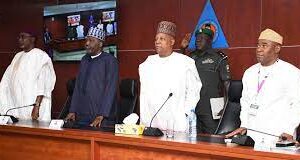Speakers at the Benue State edition of the Maitama Sule Leadership Lecture Series organised by the Student Wing of the Coalition of Northern Groups (CNG) have faulted the operations of political parties in Nigeria, lamenting that corrupt bosses of political machines at every level had dominated its structures.
Speaking at the lecture monitored online by our reporter, Thursday, the keynote speaker, Abdul-Azeez Suleiman, noted that the men who manipulate the nation’s political parties for their dubious political agenda are people who have previously won elective offices, or controlled a group of office-holders who award jobs, public contracts, and other material benefits to their cronies.
Suleiman, who is also the Spokesperson of the CNG explained that by this corrupt means, a ruling clique has kept a stranglehold over power within the PDP and APC party organizations.
“Godfatherism, and lack of internal party democracy have become the major factors militating against democratic consolidation in Nigeria by the PDP and APC which are plagued by internal wrangling, littered with factions, stink of corruption and mired in leadership crises.
“And while PDP remains one of the parties in Nigeria, where lack of internal democracy is highly visible, the way the APC becomes enmeshed in intra-party conflicts at all levels of government and its institutions barely six years into its emergence is also worrisome,” Suleiman said.
He noted that, upon the arrival of the APC on the political scene, many Nigerians hoped that it would avoid the pitfalls of the PDP and provide good governance and the much needed democracy dividends.
He said those Nigerians who believed that, at its birth nine years ago, the APC would be a better managed party than the PDP it sought to oust from government have been disappointed today.
“About nine years after, the expectations of some Nigerians that a better administered party had arrived appear to have sunk. The ruling APC has been grappling with some issues at the national and state levels as its national convention and 2023 elections beckon,” he said.
Suleiman lamented that the lack of internal democracy and the level of conflicts within PDP and APC have created serious intra-party conflict, which threatens regime stability, good governance, campaign promises delivery and poses danger for the entire nascent democracy in the country.
“It is unfortunate that the major parties in Nigeria have inevitably been handed over to godfathers, who recklessly impose candidates with questionable character and no leadership qualities on the citizens.
“Such restricted politics have become poisonous, turning into a politics of war, of acrimony and hatred, of mudslinging, anarchy, of divisions and disunity and not of cooperation, consensus and unity, not of integrity and patriotism. It is the politics of rascality, lack of maturity, blackmail and near gangsterism.
“This kind of socio-political restriction and constraint have resulted in party wrangling, war of attrition, recrimination, acrimony, coordination dilemmas, and cross-carpeting in particularly the two major political parties,” he said.
He warned that voter apathy is likely to threaten the 2023 round of fresh elections, not only because their votes may not count at the end of the day, but because they have lost interest in voting as those they had voted for before now disappointed them due to lack of performance and their rapid transformation from acute penury to stupendous wealth, all at the expense of the electorate.
On his part, the lead paper presenter, Dr Nyor Gabriel Azah of the Benue State University, said the well being of any political system is dependent on sincerity, fairness, equality and other ingredients that ensure cooperation among the citizenry.
He noted that the Nigerian political culture during colonial time was bedevilled through divide and rule, propagation of ethnic dominance, political deception and manoeuvring, enthronement of ethnic and religious sentiments, corruption, favouritism and nepotism.
“Political parties, even after independence, were formed on ethnic basis with desire of ensuring democratic ethos, rather led a foundation that today’s political parties are formed on the same basis, with a lot of damaging effects to our polity. In this case, we are going to highlight the consequences of lack of internal democracy in Nigerian political parties,” he said.
He attributed cross-carpeting, proliferation of political parties with no ideologies; endless criminal and social unrest, political violence, religious and ethnic clashes, legitimacy crises, poverty increase and underdevelopment, godfatherism, mediocrity, bureaucratic pathologies and tribalism to the absence internal party democracy.
Earlier, the Chairman of the occasion, Reverend Father Dr Hyacinth Iormem Alia, a veteran Roman Catholic Priest of the Gboko Diocese, urged the students to demand accountability of government, imbibe the culture of speaking truth to power.
He encouraged the students to participate in the processes for the selection of future leadership for the country by making deliberate and rational choices.
Rounding up the event, chairman of the Board of Trustees of the CNG, Nastura Ashir Shariff, justified the naming of the lecture series after late Ambassador Yusuf Maitama Sule.
He restated CNG’s gratitude to the late Danmasamin Kano, whose leadership, sacrifice, statesmanship, patriotism and unwavering commitment to the interests of the people of Northern Nigerian, he said, has few parallels in our nation.
“The Coalition of Northern Groups draws inspiration from the life and works of the late DanMasani, and we must strive, in all we do, to live by the personal and social values and standards he lived and set for himself as citizen, subject, and leader,” he said.




